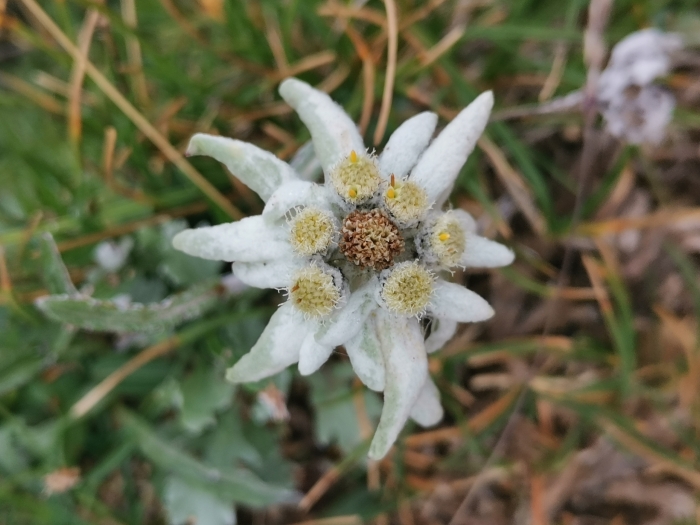Edelweiss
(Leontopodium alpinum)
Edelweiss (Leontopodium alpinum)
/
/

Ljaž
CC BY 4.0
Image By:
Ljaž
Recorded By:
Copyright:
CC BY 4.0
Copyright Notice:
Photo by: Ljaž | License Type: CC BY 4.0 | License URL: http://creativecommons.org/licenses/by/4.0/ | Rights Holder: Ljaž | Publisher: iNaturalist | Date Created: 2020-08-13T11:37:39-07:00 |

















































Estimated Native Range
Summary
Leontopodium alpinum, commonly known as Edelweiss, is a perennial herb native to the alpine regions of Eurasia, specifically found in rocky limestone places at 1,800–3,000 meters altitude. It is a member of the daisy or sunflower family, Asteraceae. The plant typically grows to a height of 3–20 centimeters (1–8 inches) in the wild, but can reach up to 40 cm (16 inches) in cultivation. Edelweiss is characterized by its woolly appearance, with leaves and flowers covered in white hairs that provide protection against the harsh alpine climate, including cold temperatures, aridity, and ultraviolet radiation. The flowering stalks bear blooms from July to September, each consisting of five to six small yellow clustered spikelet-florets surrounded by white bracts in a distinctive double-star formation, which are highly valued for their unique beauty.
Edelweiss is renowned for its resilience and is often grown in rock gardens and alpine collections for its striking appearance and historical significance as a symbol of alpinism. It requires well-drained, neutral to alkaline soil and thrives in full sun with medium water needs. While it is non-toxic and has been used in traditional medicine, it is also appreciated for its ornamental value and is sometimes used in floral arrangements. Due to its rarity in the wild, cultivation of edelweiss helps preserve this iconic species. Gardeners should note that it may require protection from excessive winter wetness to prevent root rot.CC BY-SA 4.0
Edelweiss is renowned for its resilience and is often grown in rock gardens and alpine collections for its striking appearance and historical significance as a symbol of alpinism. It requires well-drained, neutral to alkaline soil and thrives in full sun with medium water needs. While it is non-toxic and has been used in traditional medicine, it is also appreciated for its ornamental value and is sometimes used in floral arrangements. Due to its rarity in the wild, cultivation of edelweiss helps preserve this iconic species. Gardeners should note that it may require protection from excessive winter wetness to prevent root rot.CC BY-SA 4.0
Plant Description
- Plant Type: Herb
- Height: 0.5-1 feet
- Width: 0.5-1 feet
- Growth Rate: Moderate
- Flower Color: White
- Flowering Season: Spring, Summer
- Leaf Retention: Deciduous
Growth Requirements
- Sun: Full Sun
- Water: Medium
- Drainage: Slow, Medium, Fast
Common Uses
Border Plant, Rock Garden
Natural Habitat
native to the alpine regions of Eurasia, specifically found in rocky limestone places at 1,800–3,000 meters altitude
Other Names
Common Names: Edelweiß
Scientific Names: , Leontopodium alpinum, Leontopodium nivale subsp. alpinum, Gnaphalium leontopodium, Leontopodium alpinum subsp. alpinum, Leontopodium alpinum f. alpinum, Antennaria leontopodium, Filago leontopodium, Leontopodium leontopodium, Gnaphalium pulchellum
GBIF Accepted Name: Leontopodium nivale subsp. alpinum (Cass.) Greuter